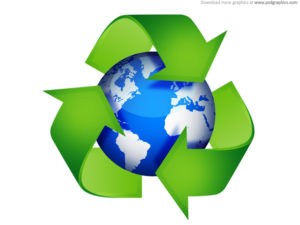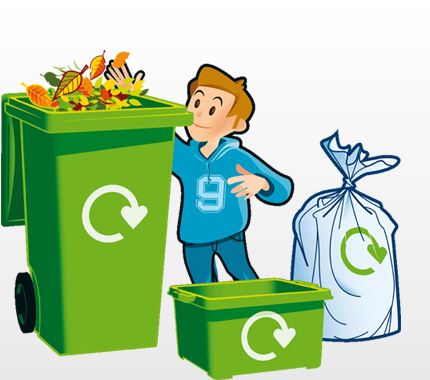WEST LONG BRANCH, N.J. – In 2011, American’s produced around 250 million tons of garbage, as reported by the Environmental Protection Agency, which is equal to 500 billion pounds. That is enough garbage to cover the state of Texas twice, and is the equivalent to burying over 82,000 football fields six feet deep in compacted trash.
This might be difficult to comprehend, and most people probably do not realize how much trash they are generating in a single year. According to the Clean Air Council, the average American throws away enough paper and plastic cups, forks, and spoons to circle the equator 300 times, and that’s just paper and plastic. In a report by the Natural Resources Defense Council, the average American also wastes more than 20 pounds of food, resulting in 40% of food in the U.S never being eaten.
Why are Americans so wasteful? You would think in a nation with the third highest population, we would be more mindful of how much waste we generate. Could it be that we are too wrapped up in our own lives that we forget how much we are hurting the environment? Or do we simply not care, and feel that our impact on the environment is not a big enough deal to us? Both cases seem entirely possible.
This is an incredibly dangerous attitude not only for us, but for future generations living on this planet. Most of us probably won’t feel the worst effects of our wastefulness in our lifetimes, but what about our children? And our children’s children? Shouldn’t we want to create the best living conditions possible for them, rather than pushing the problems we created onto them? We do our best to give our children the best clothes, food, electronic devices, and other things to make their lives better. Is the very planet we live on not as important as those material possessions? Possessions which, by the way, will not be all that important once we have passed on from this world.
One Monmouth student expressed his concern about how wasteful our nation is. Erik Harmandy, a senior studying Marine and Environmental Biology, said “Go online and search for piles of garbage in the ocean. They are massive, and the plastics won’t break down.” He goes on to say, “Even if people recycled a little bit more, it would have make a big difference.”
Let’s look at how much our wastefulness is actually hurting the environment. Right now, one of the biggest threats to our planet is the use of plastic bags, or rather, the improper disposable of them. Americans use about 102 billion plastic bags a year, and less than one percent of them are recycled. That means that 99 percent of them are being carelessly thrown away, where they will then just sit in landfills. What’s wrong with this? The problem is that light breaks down the plastic bags, creating smaller and smaller particles that contaminate the soil and local water. Plastic does not biodegrade, either, so they will sit in the ground from anywhere between five hundred and one thousand years until they finally break down.

Another threat to our environment is batteries. Most people probably do not know how to properly dispose of batteries, so they simply throw them in the garbage. Batteries are incredibly harmful because of the toxic heavy metals they contain, such as lead, mercury, and cadmium. Just like plastic bags, these toxic metals can contaminate the soil and water, making water undrinkable and dangerous for local marine life. This also goes for electronics that are carelessly thrown away, such as computers and thermostats.
The saddest part about these facts is not only can contamination of the soil and water be entirely preventable, but facilities and resources exist to make disposing of harmful wastes safe and relatively easy. The key is knowing how to properly dispose of them. For instance, plastic bags can be disposed at large stores and shopping malls, as well as chain stores that provide the bags. Plus, instead of throwing them out after using them, try holding on to them and reusing them the next time you go shopping. Many grocery stores also offer reusable grocery bags, so try to shop at those locations as much as possible.
Disposing of batteries is also simple. Many cities have established recycling centers that are endorsed by the Environmental Protection Agency that will recycle batteries. Consumer electronic chains such as Best Buy and Office Depot also have recycling kiosks either inside or outside their stores, and they will accept batteries that have been purchased from any retailer. Be careful not to donate batteries to recyclers that will ship them overseas to developing countries. Most electronic waste is sent to Asia, where workers disassemble them by hand and are exposed to toxic substances. In order to find a place near you that will recycle e-waste, use websites such as earth911.com and call2recycle.org.
Of course, simply having the knowledge of how to dispose of these wastes is not enough. In order to fully solve this issue and create a better planet for the future, action is required. Do not allow laziness and indifference to prevent you from properly disposing of harmful wastes. Remember the amount of harm you are doing to the environment by not properly recycling. Find the nearest center near you and properly recycle whatever materials you can. The bottom line is, recycle as much as you can, whenever you can. This problem is not going to solve itself overnight, so be diligent.
Even after you have done your part, don’t stop there. Encourage everyone you know to do the same. Give them strong, concrete evidence of how their actions are hurting the environment in order to make them change their ways. Do not back down, and do not give up. This is not a one man job. This requires everyone to put in an equal effort in order to make this planet a place worth living in years from now. This is our home, and it is the only one we have. Let’s try to build a better future not only for our children, but for generations of people to come.




